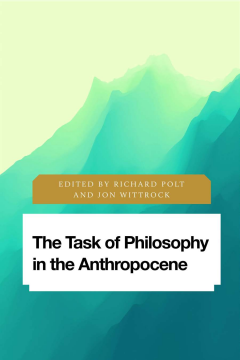
Additional Information
Book Details
Abstract
In its early modern form, philosophy gave a decisive impetus to the science and technology that have transformed the planet and brought on the so-called Anthropocene. Can philosophy now help us understand this new age and act within it? The contributors to this volume take a broad historical view as they reflect on the responsibilities and possibilities for philosophy today.
The term ‘Anthropocene’ signifies the era of the arrival of human beings as a force that affects global ecosystems in ways that are potentially disastrous for humanity itself, as well as for countless other species. This volume explores whether philosophy has meaningful tasks to fulfill in this unparalleled situation. Do philosophers need to reflect on new topics today? Do they need to think in new ways? Do they need new relationships to their own tradition? And are there concrete actions they should take, over and above philosophical reflection? The contributors to this volume thus take on the question of the relevance and responsibility of philosophy, drawing upon diverse legacies, in the current global situation.
Richard Polt is Professor of Philosophy at Xavier University. With Gregory Fried he has translated Heidegger’s Introduction to Metaphysics and Being and Truth, and edited A Companion to Heidegger’s “Introduction to Metaphysics” and Nature, History, State: 1933-1934.
Jon Wittrock is Senior Lecturer in Political Science at Södertörn University, Sweden.
What is the task of philosophy in the Anthropocene? One thing is for certain: we cannot merely rely upon established conceptual systems but rather must think deeply and question boldly as we reconsider what it means to be. This impressive array of “axial echoes” offers a glimpse of what it would mean to renegotiate human existence in the Anthropocene.
Casey Rentmeester, Associate Professor of Philosophy, Bellin College
Table of Contents
| Section Title | Page | Action | Price |
|---|---|---|---|
| The Task of Philosophy in the Anthropocene | Cover | ||
| Contents | v | ||
| Acknowledgments | vii | ||
| Introduction | ix | ||
| 1 Environmental Cosmopolitanism as a Philosophy for the Anthropocene | 1 | ||
| 2 The Coming of the Post-Axial Age | 23 | ||
| 3 On Nature and Liberation | 43 | ||
| 4 Eidetic Eros and the Liquidation of the Real | 63 | ||
| 5 Odysseus on the Beach: Humanity between the Anthropocene and the Hubriscene | 85 | ||
| 6 Starting from Ourselves as Living Beings | 107 | ||
| 7 Philosophy’s Homecoming | 119 | ||
| 8 The Uncanny Anthropocene | 135 | ||
| 9 Which Way I Fly: Reforming Nihilism in the Anthropocene | 153 | ||
| 10 Ecological Finitude as Ontological Finitude: Radical Hope in the Anthropocene | 175 | ||
| 11 The Voices of Nature: Toward a Polyphonic Conception of Philosophy | 193 | ||
| Index | 215 | ||
| About the Contributors | 223 |
